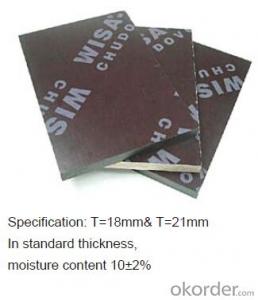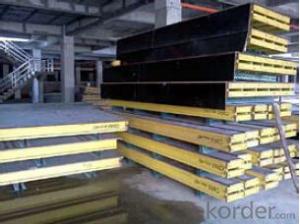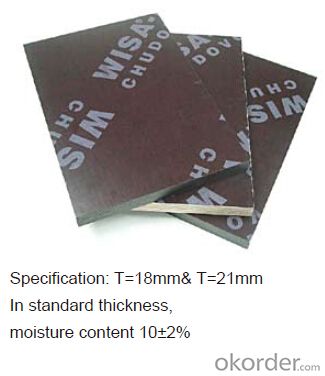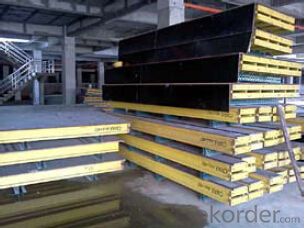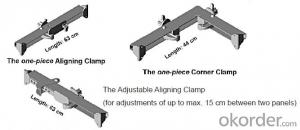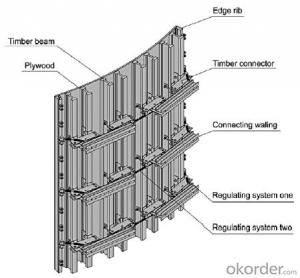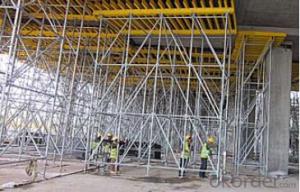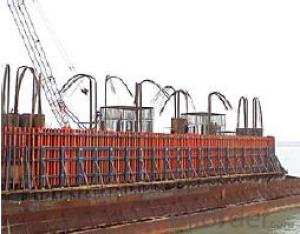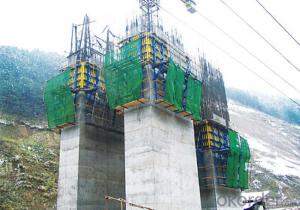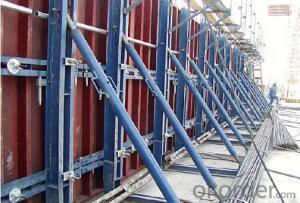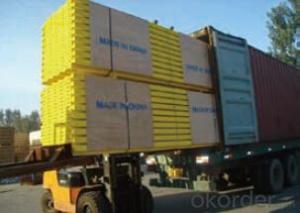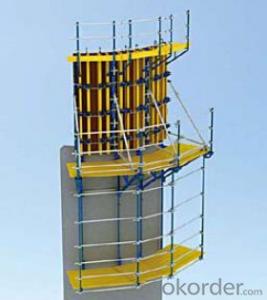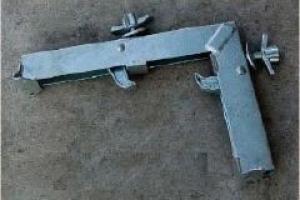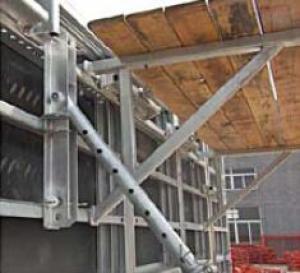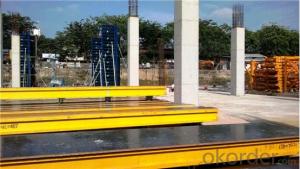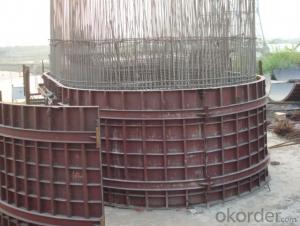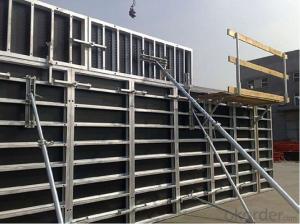Plywood-Formwork System for Formwork and Scaffolding
- Loading Port:
- Tianjin
- Payment Terms:
- TT OR LC
- Min Order Qty:
- 50 m²
- Supply Capability:
- 1000 m²/month
OKorder Service Pledge
Quality Product, Order Online Tracking, Timely Delivery
OKorder Financial Service
Credit Rating, Credit Services, Credit Purchasing
You Might Also Like
Plywood --- make perfect concrete surface
WISA-Form Birch is a coated special plywood using in the formwork systems where high
requirements are set on the concrete surface and the times of reuses.
With CNBM timber beam & WISA plywood, the formwork is low weight but high load capacity, it is
widely used in construction.
Characteristics:
◆ Component with high standardization.
◆ Assembling in site, flexible application.
◆ Light weight, easy transportation and storage.
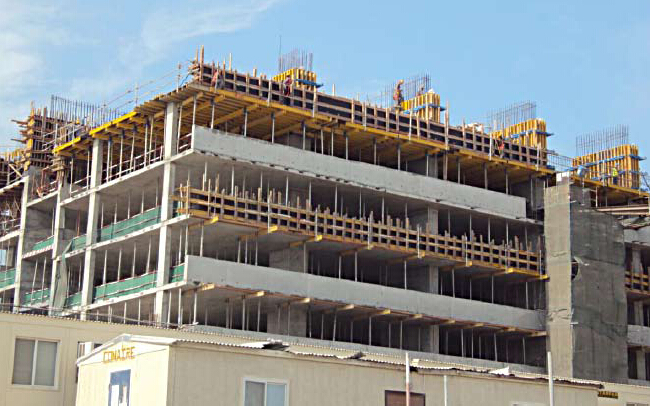
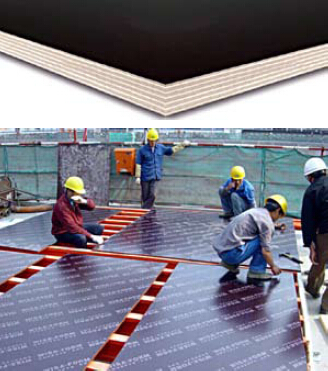
- Q: Can steel formwork be used for architectural concrete walls with complex geometries?
- Yes, steel formwork can be used for architectural concrete walls with complex geometries. Steel formwork offers excellent strength and durability, making it suitable for creating intricate shapes and designs in concrete walls. It provides the necessary support and stability during the casting process, ensuring that the concrete retains its desired form and shape. Additionally, steel formwork is versatile and can be easily customized to meet the specific requirements of complex architectural designs.
- Q: Can steel formwork be used for both straight and sloping structures?
- Yes, steel formwork can be used for both straight and sloping structures. Steel formwork is a versatile and flexible construction material that can be customized to fit various shapes and configurations. It can be easily adjusted and secured to create straight walls and columns. Additionally, with the use of specialized accessories and components, steel formwork can also be adapted to create sloping structures such as ramps, inclined walls, and curved surfaces. This flexibility and adaptability make steel formwork a preferred choice for construction projects with varying design requirements.
- Q: How does steel formwork contribute to the overall structural integrity of the building?
- Steel formwork contributes to the overall structural integrity of the building by providing a strong and durable framework for concrete construction. It ensures accurate and precise alignment of walls, columns, and beams, resulting in a structurally sound and stable building. The steel formwork system is capable of withstanding heavy loads and forces during construction and enhances the overall strength and stability of the structure. Additionally, the use of steel formwork allows for easy and efficient construction, reducing construction time and costs while ensuring high-quality and long-lasting buildings.
- Q: What are the different sizes and dimensions available for steel formwork panels?
- The sizes and dimensions of steel formwork panels can vary depending on the manufacturer and specific project requirements. However, common sizes range from 1.2 meters by 1.8 meters to 3 meters by 6 meters. Additionally, panels can have different thicknesses, typically ranging from 12mm to 18mm.
- Q: Can steel formwork be used for school construction projects?
- Indeed, school construction projects can make use of steel formwork. Steel formwork, being a resilient and versatile construction material, is capable of withstanding the immense loads and pressures encountered within school buildings. It provides a robust and steadfast framework for pouring concrete, thus ensuring the structural integrity of the construction. Furthermore, steel formwork is designed to be reusable, thereby offering a cost-effective option for school construction projects. Its adaptability allows for the creation of various shapes and sizes, catering to the distinct architectural designs typically found in school buildings. Moreover, steel formwork facilitates faster construction times when compared to traditional timber formwork, enabling the swift completion of school projects. In summary, steel formwork represents a fitting and dependable choice for school construction projects.
- Q: Can steel formwork be customized for specific projects?
- Yes, steel formwork can be customized for specific projects. Steel formwork is highly versatile and can be adjusted and tailored to meet the specific requirements and dimensions of different construction projects. This customization allows for greater flexibility in design and construction, ensuring that the formwork system perfectly fits the project's needs.
- Q: Is steel formwork suitable for projects with high formwork reusability?
- Yes, steel formwork is suitable for projects with high formwork reusability. Steel formwork is known for its durability and strength, which allows it to withstand multiple uses without significant wear and tear. It can be easily assembled and disassembled, making it efficient for reuse on different projects. Additionally, steel formwork provides a smooth and consistent finish to concrete structures, ensuring high-quality results. While the initial cost of steel formwork may be higher compared to other types of formwork, its long lifespan and reusability make it a cost-effective solution for projects requiring frequent formwork reuse.
- Q: Are there any specific considerations for using steel formwork in seismic zones?
- Yes, there are specific considerations for using steel formwork in seismic zones. Steel formwork is known for its high strength and rigidity, which makes it suitable for withstanding seismic forces. However, it is essential to ensure that the steel formwork is designed and installed correctly to withstand the expected seismic loads. This includes using robust connections, adequate bracing, and proper reinforcement. Additionally, the formwork should be inspected regularly to identify any potential vulnerabilities or damage that could compromise its performance during an earthquake.
- Q: How does steel formwork handle different concrete pouring temperatures?
- Steel formwork is highly versatile and can handle different concrete pouring temperatures effectively. Due to the inherent strength and durability of steel, it can withstand high temperatures without warping or deforming. This allows it to safely accommodate the heat generated during the curing process of concrete, ensuring that the formwork remains intact and maintains its shape. Additionally, steel formwork has excellent thermal conductivity, which helps in dissipating excess heat and maintaining a consistent temperature throughout the structure. Overall, steel formwork is well-suited to handle various concrete pouring temperatures, making it a reliable choice for construction projects.
- Q: How does steel formwork affect the schedule of a construction project?
- Steel formwork can have a positive impact on the schedule of a construction project. Compared to traditional formwork methods, steel formwork is quicker to set up and dismantle, reducing the time required for formwork installation and removal. This efficiency allows for faster construction progress, enabling the project to stay on schedule or even be completed ahead of time. Additionally, steel formwork is highly durable and can be reused multiple times, further saving time by eliminating the need for constant formwork replacement.
Send your message to us
Plywood-Formwork System for Formwork and Scaffolding
- Loading Port:
- Tianjin
- Payment Terms:
- TT OR LC
- Min Order Qty:
- 50 m²
- Supply Capability:
- 1000 m²/month
OKorder Service Pledge
Quality Product, Order Online Tracking, Timely Delivery
OKorder Financial Service
Credit Rating, Credit Services, Credit Purchasing
Similar products
Hot products
Hot Searches
Related keywords
